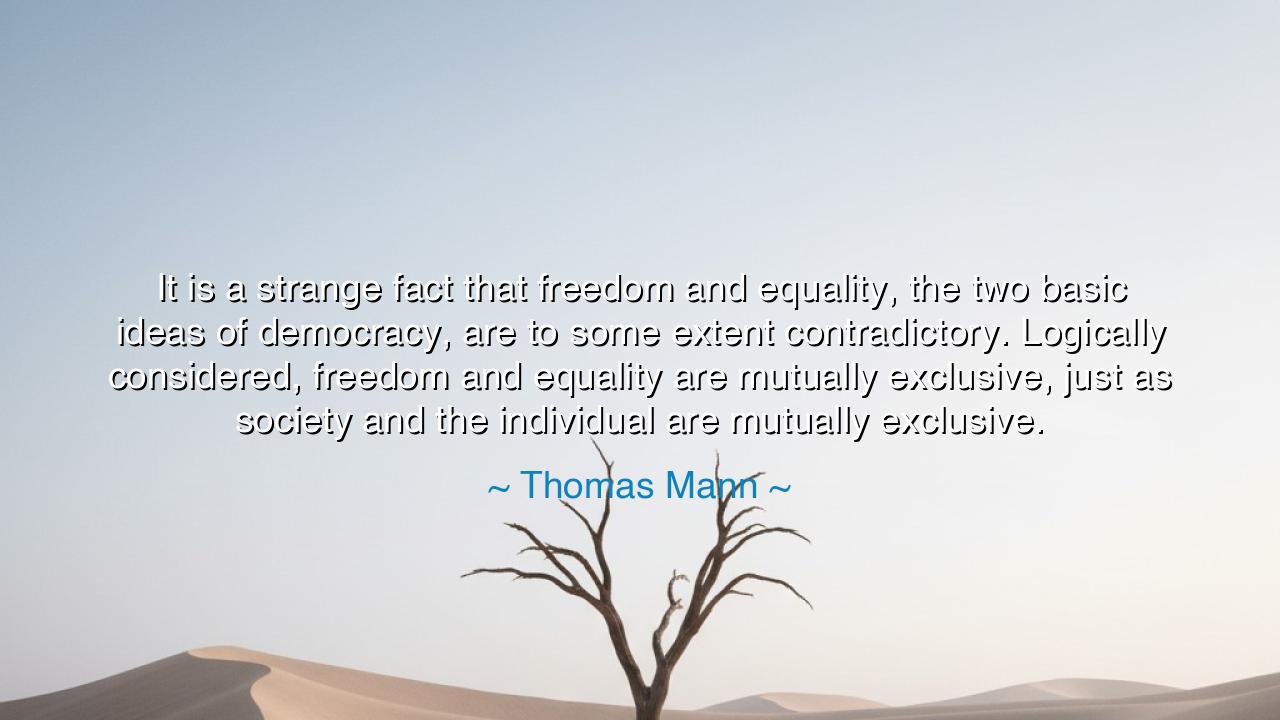
It is a strange fact that freedom and equality, the two basic
It is a strange fact that freedom and equality, the two basic ideas of democracy, are to some extent contradictory. Logically considered, freedom and equality are mutually exclusive, just as society and the individual are mutually exclusive.






“It is a strange fact that freedom and equality, the two basic ideas of democracy, are to some extent contradictory. Logically considered, freedom and equality are mutually exclusive, just as society and the individual are mutually exclusive.” These words of Thomas Mann, the great German novelist and philosopher of the twentieth century, strike at the very heart of civilization’s most noble yet most fragile dream — the dream of democracy. In his reflection, Mann does not condemn democracy, but rather exposes its deepest paradox. He reveals the eternal tension between freedom, which gives the individual the right to rise, and equality, which seeks to hold all men on level ground. Like two mighty rivers flowing in opposite directions, these ideals often clash where they meet, and it is only through wisdom, humility, and constant vigilance that they can coexist.
When Mann calls it a “strange fact”, he is acknowledging the irony that democracy, the system built upon both freedom and equality, depends on a balance that can never be perfectly achieved. Freedom allows a person to dream, to act, to achieve greatness — but when exercised fully, it inevitably creates differences: the strong and the weak, the rich and the poor, the learned and the ignorant. Equality, on the other hand, seeks to erase these differences, to ensure fairness and shared dignity. Yet to enforce equality too strictly is to limit freedom itself — to forbid the excellence that freedom makes possible. Thus, Mann unveils a truth both logical and tragic: that what uplifts the individual may weaken the collective, and what protects the collective may restrain the individual.
The origin of Mann’s insight lies in his own life and times. Born in 1875, he witnessed both the rise of fascism and the decay of liberal ideals in Europe. He saw Germany, once a land of intellect and culture, surrender its freedom in the name of unity and order. He watched how the promise of equality, distorted by totalitarian power, became a tool of oppression. Mann understood that when equality is enforced without liberty, it becomes tyranny — and when liberty is pursued without equality, it becomes chaos. His words are not a rejection of democracy, but a warning to future generations: that democracy must live not in perfection, but in perpetual tension, for it is this tension that keeps it alive.
Consider the history of the French Revolution, born under the cry of “Liberté, Égalité, Fraternité.” It began with noble purpose — to free the people from monarchy and grant equality to all. Yet in its zeal, the Revolution consumed itself. Liberty was devoured by fear; equality was pursued through violence. The guillotine, meant to symbolize justice, became a symbol of terror. Thomas Mann’s words find their echo there: when the quest for equality destroys freedom, both are lost. The Revolution teaches us that noble ideals, untempered by wisdom, can turn upon themselves like a serpent swallowing its own tail.
Yet Mann’s observation is not merely political — it is philosophical, even spiritual. For within every human being, the same struggle exists. The individual longs for independence, for the freedom to live according to one’s will. But to live among others, one must yield, compromise, and respect boundaries. Society demands cooperation; individuality demands expression. This eternal dance — between self and community, liberty and equality — is not meant to be resolved, but to be balanced. Like the tension between day and night, it defines the rhythm of human life. Without one, the other loses meaning.
In modern times, this paradox continues. We see nations striving to lift the poor while preserving ambition; we see debates between those who champion unrestrained liberty and those who call for shared justice. Each side, blind to the other, risks tearing the democratic fabric apart. Mann’s wisdom reminds us that the answer lies not in choosing one over the other, but in cultivating harmony between them. Freedom without conscience becomes greed; equality without compassion becomes conformity. A just society must make room for excellence while ensuring dignity for all — a delicate balance that must be renewed by every generation.
So let this be the lesson of Thomas Mann’s words: do not curse the contradiction, but honor it. For the struggle between freedom and equality is the struggle of civilization itself — the test of whether man can live both as an individual and as a brother among men. Do not seek a world where all are the same, nor one where all are divided, but a world where each may rise without trampling another. Let your freedom be guided by mercy, and your equality by respect for individuality. For democracy is not a finished temple, but a living fire — one that must be tended with both the spark of liberty and the steady warmth of justice, lest it flicker and fade into the night.






AAdministratorAdministrator
Welcome, honored guests. Please leave a comment, we will respond soon